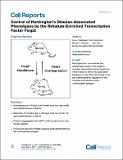Control of Huntington’s Disease-Associated Phenotypes by the Striatum-Enriched Transcription Factor Foxp2
Author(s)
Carmona, Vitor; Heilbut, Adrian; Sittler, Annie; Pereira de Almeida, Luís; Mesirov, Jill P.; Gao, Fan; Kolaczyk, Eric D.; Hachigian, Lea; Fenster, Robert; Kulicke, Ruth; Heiman, Myriam; ... Show more Show less
Download1-s2.0-S2211124717316388-main.pdf (1.908Mb)
PUBLISHER_CC
Publisher with Creative Commons License
Creative Commons Attribution
Terms of use
Metadata
Show full item recordAbstract
Alteration of corticostriatal glutamatergic function is an early pathophysiological change associated with Huntington's disease (HD). The factors that regulate the maintenance of corticostriatal glutamatergic synapses post-developmentally are not well understood. Recently, the striatum-enriched transcription factor Foxp2 was implicated in the development of these synapses. Here, we show that, in mice, overexpression of Foxp2 in the adult striatum of two models of HD leads to rescue of HD-associated behaviors, while knockdown of Foxp2 in wild-type mice leads to development of HD-associated behaviors. We note that Foxp2 encodes the longest polyglutamine repeat protein in the human reference genome, and we show that it can be sequestered into aggregates with polyglutamine-expanded mutant Huntingtin protein (mHTT). Foxp2 overexpression in HD model mice leads to altered expression of several genes associated with synaptic function, genes that present additional targets for normalization of corticostriatal dysfunction in HD. Hachigian et al. demonstrate that manipulating levels of the striatum-enriched transcription factor Foxp2 can either rescue or mimic HD-associated behaviors in vivo. They link Foxp2 to the post-developmental regulation of the structure and function of the corticostriatal synapse.Keywords: Huntington’s disease; Foxp2; striatum;
corticostriatal synapse
Date issued
2017-12Department
Massachusetts Institute of Technology. Department of Brain and Cognitive Sciences; Picower Institute for Learning and MemoryJournal
Cell Reports
Publisher
Elsevier
Citation
Hachigian, Lea J. et al. “Control of Huntington’s Disease-Associated Phenotypes by the Striatum-Enriched Transcription Factor Foxp2.” Cell Reports 21, 10 (December 2017): 2688–2695 © 2017 The Authors
Version: Final published version
ISSN
2211-1247